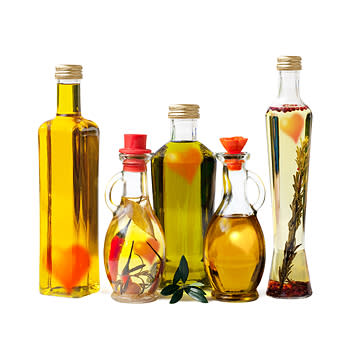Heart-Smart Cooking Oils: Which to Use for What

Foodies' demands for a sweet plant oil may have put virgin coconut oil back on grocery store shelves, but if you're concerned about keeping your heart healthy, better wait until the scientific dust settles on this one. Researchers are debating whether lauric acid, the saturated fat in coconut oil, is truly harmless. Meanwhile, there are plenty of heart-smart plant oils that deliver cholesterol-lowering benefits.
Related: Watch this video to learn how to season a cast-iron pan.
These oils are rich in healthful monounsaturated and/or polyunsaturated good fats -- unless you overheat some of them. Then, those perks go up in smoke. That's because heating oil at temperatures high enough to cause smoking not only affects the food's taste and destroys nutrients but also creates potential carcinogens. Here's how to pick the right oil for the right dish. Quick note: 1 tablespoon of all of these fats has about 120 calories and 14 grams of fat, but only 2 grams of saturated fat -- and canola oil has even less, only 1 gram of saturated fat; grapeseed oil has 1.3 grams.
Related: Choose these healthful fats at the salad bar.
In the cooking category...
Canola: Yes, there really is a canola plant (it's a relatively new hybrid, developed in the 1970s). The virtually tasteless oil made from canola seeds has a high smoking point (400 degrees Fahrenheit or more). You can use it to cook pretty much everything, including stir-fries. It has the least saturated fat of any plant oil (about half that of olive, peanut, and sesame oils).
Related: Use canola oil to lightly brown these curried crab cakes.
Grapeseed: Although a tad pricier than most plant oils, grapeseed oil's neutral flavor won't overwhelm even the most delicate fish or vegetables. Yet its relatively high smoking point (about 420 degrees Fahrenheit) means it's fine for brushing on fish or vegetables before grilling. Grapeseed oil is also high in vitamin E.
Related: Ginger heated in grapeseed oil holds onto its flavor. Try this Hana-style sauce on steamed fish.
Peanut: It has an even higher smoking point (around 440 degrees Fahrenheit). And, like canola oil, refined peanut oil is nearly tasteless. If you want the yummy, peanutty flavor that makes Southeast Asian dishes so delicious, cook with refined oil, but add a few drops of roasted peanut oil just before serving.
Related: Peanut oil and dry roasted peanuts make this pad thai a classic.
Sesame: Refined light sesame oil has the highest smoking point here (about 450 degrees Fahrenheit), which makes it terrific for sizzling stir-fries, though it doesn't add much flavor.
In the drizzling and dipping category...
Extra-virgin olive: It's so heat sensitive, chefs usually recommend not cooking with it -- it's too delicate and too expensive. Instead, cook with pure or virgin olive oil, which can take much higher heat. Use either one to quickly saute vegetables in a hot pan or slowly roast oil-spritzed veggies at 325-350 degrees Fahrenheit.
Related: Here's a quick and easy vinaigrette for your greens.
Dark sesame: Reserve delicious dark sesame oil for drizzling on Asian noodle dishes or miso soup. Its smoking point is a fairly low 350 degrees Fahrenheit.
The biggest benefit of keeping your cuisine well-oiled with these healthier options? Eating only healthful fat can make your RealAge 3.4 years younger.
Get more health tips from RealAge:
